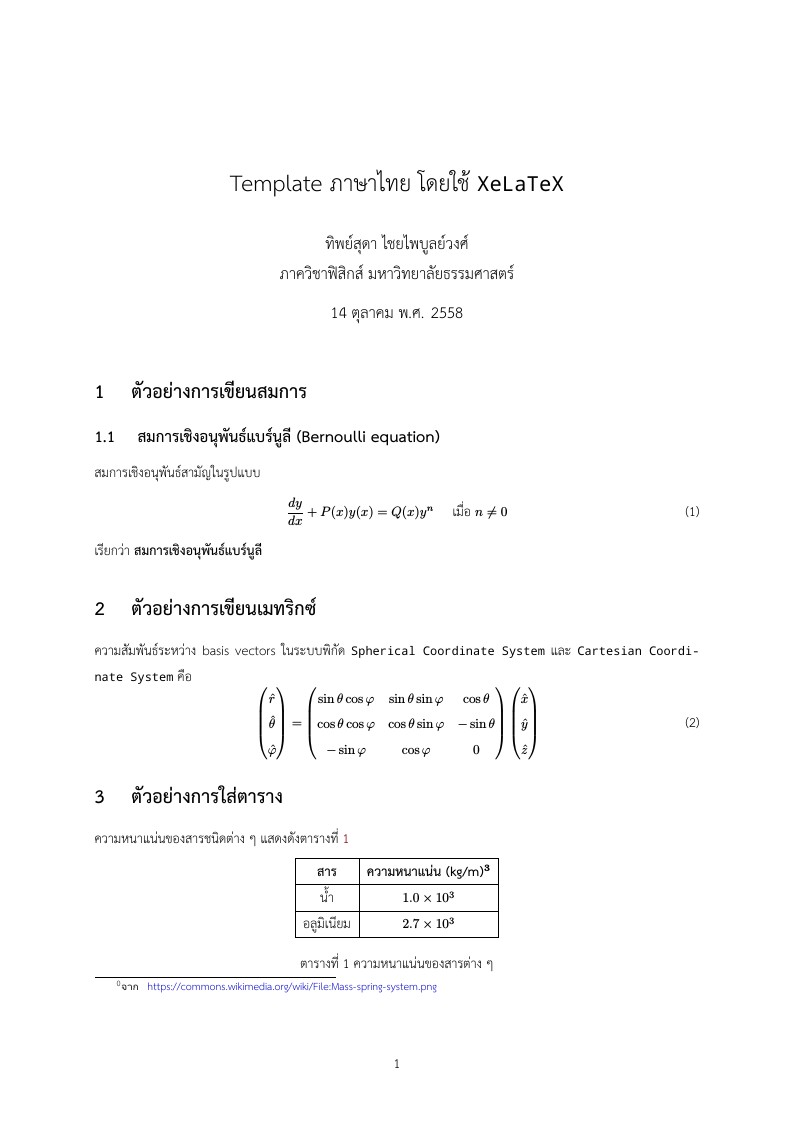
Thai Example (Using XeLaTeX)

\documentclass[20pt,a4paper]{article}
\usepackage[a4paper, top=2.5cm, bottom=2.5cm, left=2.5cm, right=2.5cm]{geometry}
\usepackage{amsmath,esint,mathtools}
%------------ ปรับสีลิงค์และ url -----------%/a
\usepackage{xcolor}
\usepackage[unicode=true]{hyperref}
\hypersetup{
colorlinks,
linkcolor={red!50!black},
citecolor={blue!50!black},
urlcolor={blue!80!black},
}
\renewcommand\UrlFont{\normalfont}
%------------ สำหรับการใช้ฟ้อนท์ภาษาไทย -----------%
\usepackage[no-math]{fontspec}
\usepackage{xunicode}
\usepackage{xltxtra}
\XeTeXlinebreaklocale "th"
\renewcommand{\baselinestretch}{1.6}
\setmainfont[Script=Thai,Scale=1.4,ItalicFont={THSarabunNew_Italic.ttf}, BoldFont={THSarabunNew_Bold.ttf},BoldItalicFont={THSarabunNew_BoldItalic.ttf} ]{THSarabunNew.ttf}
\setmonofont[Script=Thai,Scale=0.9]{DroidSansMono.ttf}
%--------------- เปลี่ยนชื่อรูปและตาราง -------------%
\usepackage[labelsep=space]{caption}
\renewcommand{\figurename}{รูปที่}
\renewcommand{\tablename}{ตารางที่}
%--------------- กำหนดรูปแบบการอ้างอิง -------------%
\usepackage[numbers,sort&compress]{natbib}
%-----------------------------------------------%
\author{ทิพย์สุดา ไชยไพบูลย์วงศ์\\ภาควิชาฟิสิกส์ มหาวิทยาลัยธรรมศาสตร์}
\title{Template ภาษาไทย โดยใช้ \texttt{XeLaTeX}}
\date{14 ตุลาคม พ.ศ. 2558}
%-----------------------------------------------%
% START %
%-----------------------------------------------%
\begin{document}
\maketitle
%--------------------------------------
\section{ตัวอย่างการเขียนสมการ}
\subsection[ตัวอย่างการเขียนสมการเชิงอนุพันธ์แบร์นูลี (Bernoulli equation)]{สมการเชิงอนุพันธ์แบร์นูลี (Bernoulli equation)}
\footnotetext{\texttt{จาก } \url{https://commons.wikimedia.org/wiki/File:Mass-spring-system.png}}
สมการเชิงอนุพันธ์สามัญในรูปแบบ
\begin{equation}
\frac{dy}{dx}+P(x)y(x)=Q(x)y^n\quad\text{เมื่อ }n\neq 0
\end{equation}
เรียกว่า \textbf{สมการเชิงอนุพันธ์แบร์นูลี}
\section{ตัวอย่างการเขียนเมทริกซ์}
ความสัมพันธ์ระหว่าง basis vectors ในระบบพิกัด \texttt{Spherical Coordinate System} และ \texttt{Cartesian Coordinate System} คือ
\begin{equation}
\begin{pmatrix}
\hat{r}\\ \hat{\theta}\\ \hat{\varphi}
\end{pmatrix}
=
\begin{pmatrix}
\sin\theta\cos\varphi&\sin\theta\sin\varphi&\cos\theta\\
\cos\theta\cos\varphi&\cos\theta\sin\varphi&-\sin\theta\\
-\sin\varphi&\cos\varphi&0\\
\end{pmatrix}
\begin{pmatrix}
\hat{x}\\ \hat{y}\\ \hat{z}
\end{pmatrix}
\end{equation}
%--------------------------------------
\section{ตัวอย่างการใส่ตาราง}
ความหนาแน่นของสารชนิดต่าง ๆ แสดงดังตารางที่ \ref{Tab:Density}
\begin{center}
\begin{tabular}{|c|c|}
\hline
\textbf{สาร} & \textbf{ความหนาแน่น (kg/m)}$^\mathbf{3}$\\ \hline
น้ำ & $1.0\times10^3$ \\ \hline
อลูมิเนียม & $2.7\times10^3$ \\ \hline
\end{tabular}
\captionof{table}{ความหนาแน่นของสารต่าง ๆ}
\label{Tab:Density}
\end{center}
%--------------------------------------
\section{ตัวอย่างการทำ in-text citation และการใส่สมการแบบหลายบรรทัด}
พิจารณาการเคลื่้อนที่ในหนึ่งมิติของระบบมวล-สปริงที่มีค่าคงที่ของสปริง $k$ แลแรงเสียดทานอากาศที่แปรผันตามความเร็ว $v$ ของการเคลื่อนที่คือ $bv$ เมื่อ $b$ คือค่าคงที่ โดยอาศัยสมการการเคลื่อนที่ของนิวตัน \citep{Hal13,You13,Ser13} จะได้ว่า
\begin{align}
\sum{F}&=ma\nonumber\\
-kx-bv&=m\frac{d^2x}{dt^2}\nonumber\\
\frac{d^2x}{dt^2}+\frac{b}{m}\dfrac{dx}{dt}+\frac{k}{m}x&=0
\label{Eq:MotionOfMassSpringSys}
\end{align}
สมการที่ \ref{Eq:MotionOfMassSpringSys} เป็นสมการอนุพันธ์การเคลื่อนที่ของระบบมวล-สปริง
%--------------------------------------
\renewcommand\refname{\vskip -1cm}
\section{เอกสารอ้าง}
\bibliographystyle{unsrtnat}
\bibliography{References}
\end{document}